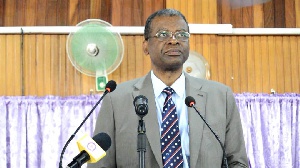The Vice Chancellor of University of Mines and Technology (UMaT), Professor Jerry Samuel Yaw Kuma has maintained that 13,500 tonnes of rubbish are generated in Ghana annually.
Prof. Kuma attributed the high volumes of waste generated in the country both solid and liquid to population growth, urbanization and rising consumption and the attitude and behaviour of the general masses, especially the use of rubber and polythene bags in the country as a major problems to the menace.
The Vice Chancellor of the University of Mines and Technology, Prof. Jerry Samuel Yaw Kuma made this known at the 9th S. H. Amissah memorial lectures of the Methodist Church at Tarkwa in the Western Region at the weekend under the theme: "Promoting Our Civic Responsibilities Towards Sustainable Environment: The Role of the Church and State".
Tlay Movement Council of the Methodist Church of Ghana in 2011 instituted the S. H. Amissah memorial lectures to appreciate and honour the lay stalwarts of old for their selfless, committed and dedicated service to the church and the kingdom business in general.
Even though the lectures is to honour all the lay stalwarts, it has been customary for the names of the past Vice president and lay president to be singled out in successive lectures to represent the many who blazed the trail of the church's history altruistic dedication and devotion to duty.
After the maiden lectures in 2011, the church and the lay movement council have organised a successive lectures to honour its heroes who represent the laity for their sacrifice commitment and dedication to the church and humanity.
The 9th session of the S. H. Amissah was focused on the environment and how the church and the state can come together and contribute its role immensely to preserve the environment which fast polluted and degraded.
The 9th S. H. Amissah memorial lecture was on the theme: "Promoting Our Civic Responsibilities Towards Sustainable Environment; The Role of the Church and State".
It is estimated that the annual cost of natural resources and environmental degradation in Ghana is equivalent to about 9.6 percent of the GDP because of the unsustainable management of the country's forests, land resources, wildlife fisheries and health impacts of environmental factors.
Bad waste management can result in land and air pollution and can cause respiratory problems and other adverse health effects as contaminants are absorbed from the lungs into other part of the body.
The act of littering has become the habit of many Ghanaians, irrespective of where they find themselves. Sachet water, polythene bags which are the commonest of all litter, have chocked almost every gutter in the various cities and towns in the country.
Littering the environment is a criminal offence punishable by law. Offenders are either given a fine or are prosecuted by law. If that be the case, then one can emphatically say that about 90 percent of Ghanaians in the country fall foul of this law.
Littering makes the environment unhygienic, resulting in the contagious disease like typhoid which in the long run, makes the government spend more in the Health sector.
Apart from poor drainage system being one of the main causes of flooding, littering around indiscriminately has been considered a cause of flooding, as it has caused most of the few existing drains in the country to become chocked.
Cleanliness they say is next to godliness.
The Vice Chancellor of the University of Mines and Technology (UMaT), Prof. Jerry Samuel Yaw Kuma described the indiscriminate disposal of refuse in the streets as worrying because it has an adverse effects on the environment and the health of Ghanaians and the world at large.
The Presiding Bishop of the Methodist Church of Ghana, Most Rev. Dr. Paul Kwabena Boafo addressing the congregants urged members of the Methodist Church to put in every efforts to play their Civic role to ensure the environment is sustained.
The Bishop of Tarkwa Diocese of the Methodist Church of Ghana, Right Rev. Thomas Amponsah Donkor in an interview called on the government to ensure that the country's environmental laws are enforced to restrain people from littering around irrespective of political affiliations.
General News of Tuesday, 12 March 2019
Source: Mathew Dadzie

















